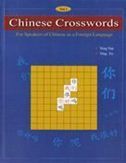Chinese Crosswords: For Speakers of Chinese as a Foreign Language
Publisher:
Cypress Book
Publication:
1/2005
Languages:
English, Chinese
Sales in last 12 months:
63
Binding:
Paperback
ISBN/SKU:
9781845700034
Pages:
140
Sizes:
196 x 140mm
Weight:
0.2400
In Stock To be dispatched within 1 business day
£1.50
£1.50
(€1.68)
Chinese Crosswords aims to offer another alternative way of learning Chinese while having fun. The book is designed:
To help readers' further understanding of some of the most often-used words and sentences in specific communicative and social contexts.
To assist readers in learning more about Chinese culture in association with the language.
To encourage readers to associate words with other knowledge.
To enlarge readers' vocabulary.
To practise a very useful reading skill: guessing in context.
To be a reference book for teachers in designing vocabulary exercises.
The book is designed on the basis of the English crossword concept. It consists of two parts: blank boxes in a grid and English clues. The book users are required to fill in the blank boxes with the words, phrases and sentences according to the provided clues. Unlike English crosswords, you fill in each box with a character (or its equivalent in Pinyin) instead of a letter.
To help readers' further understanding of some of the most often-used words and sentences in specific communicative and social contexts.
To assist readers in learning more about Chinese culture in association with the language.
To encourage readers to associate words with other knowledge.
To enlarge readers' vocabulary.
To practise a very useful reading skill: guessing in context.
To be a reference book for teachers in designing vocabulary exercises.
The book is designed on the basis of the English crossword concept. It consists of two parts: blank boxes in a grid and English clues. The book users are required to fill in the blank boxes with the words, phrases and sentences according to the provided clues. Unlike English crosswords, you fill in each box with a character (or its equivalent in Pinyin) instead of a letter.




